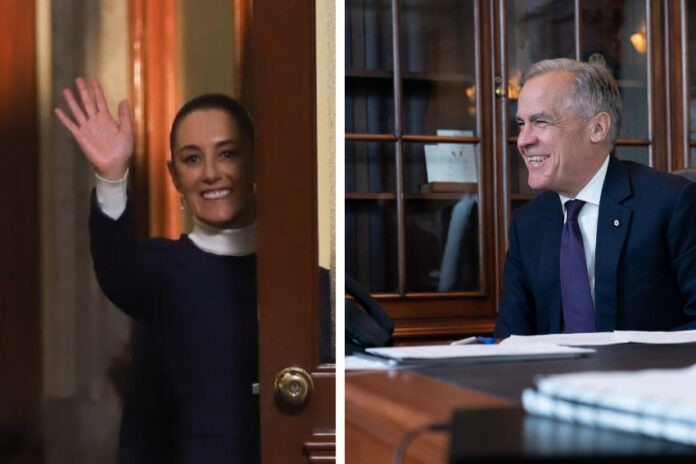President Claudia Sheinbaum and Canadian Prime Minister Mark Carney discussed the importance of the U.S.-Mexico-Canada trade agreement (USMCA) during a phone conversation on Thursday.
The chat occurred as talks related to a mandated review of the USMCA appear set to begin ahead of schedule.
On Tuesday, Mexico’s Economy Minister Marcelo Ebrard said he expected the USMCA review process to begin in the second half of 2025. The review — scheduled for July 2026 — could lead to renegotiations, extensions or even withdrawal.
In their phone conversation, Carney and Sheinbaum confirmed their commitment to the USMCA, which went into effect on July 1, 2020, agreeing that it has boosted the competitiveness of the three North American countries.
In a press release, Carney’s office said the two leaders discussed “building on the strong trade relationship between the two countries,” grounded in the USMCA, and “the imperative to strengthen their respective economies against future shocks.”
The Mexican government said in a social media post that the two leaders also discussed priority issues in their bilateral relationship, including the continuity and strengthening of the Seasonal Agricultural Worker Program.
La presidenta @Claudiashein conversó telefónicamente con el primer ministro de Canadá, @MarkJCarney, a quien felicitó por la ratificación de su mandato. Dialogaron sobre asuntos prioritarios de la relación bilateral, la continuidad y fortalecimiento del Programa de Trabajadores…
— Gobierno de México (@GobiernoMX) May 15, 2025
Both leaders tasked their senior officials to begin working to find opportunities to deepen bilateral relations. They also agreed to remain in close contact.
Sheinbaum initiated the phone call by congratulating Carney for his April 28 election victory. His Cabinet was sworn into office on May 13.
Carney, the governor of Canada’s central bank from 2008-2013 and governor of the Bank of England from 2013-2020, met with U.S. President Donald Trump at the White House on May 6.
Positive outlook on USMCA review prospects
In discussing the early start to the USMCA review, Ebrard said the accelerated timeline aligns with the U.S. government’s focus on trade negotiations over the next three months, adding that it could be advantageous for Mexico.
Speaking at a forum hosted by Mexico’s Employers Confederation this week, Ebrard said early talks would provide greater clarity on Mexico’s position within the global trade landscape.
“The reality [of global economics] is pushing us toward deeper regional integration,” he said. “Mexico and Canada are indispensable [to the United States] in various areas, particularly if the goal is to remain competitive against Asia.”

A day later, Ebrard reiterated this belief, saying that early review would serve to reduce uncertainty among investors and consumers.
The USMCA replaced the North American Free Trade Agreement that had governed trade among Mexico, Canada and the United States since 1994. The continuity of USMCA came into question following Trump’s May 6 remarks Trump in which he described it as a “transitional” arrangement that he intends to renegotiate “very soon.”
Sheinbaum dismissed speculation the deal might be dismantled, however, voicing confidence that the United States would see the value in maintaining it.
With reports from El Economista and El Financiero
